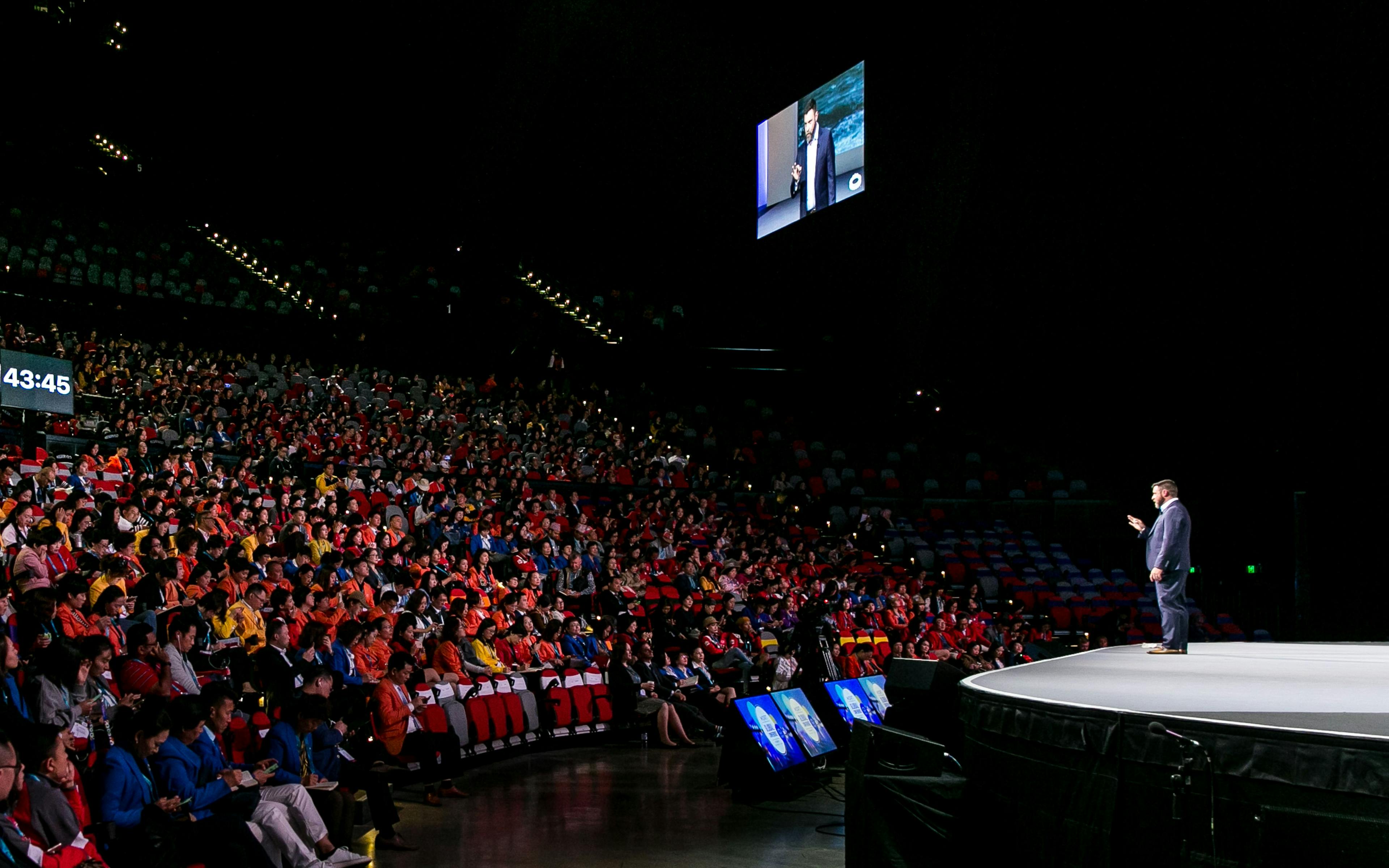
Leadership and Legacy: ABC's 2024 Convention Speaker
Kevin Brown spent 32 years in the franchise world, the last 20 of them with Servpro, the damage-restoration company. “A business that nobody wants to do business with until they have a disaster,” Brown says with a dry laugh, “and then they’re really glad that you’re there.”
In that type of environment, leaders need to instill in employees “those kinds of core beliefs that say, ‘What we do matters. What we do makes a difference,’” says Brown, who today is a professional speaker and the bestselling author of “The Hero Effect: Being Your Best When It Matters the Most” and “Unleashing Your Hero: Rise Above Any Challenge, Expand Your Impact and Be the Hero the World Needs.” He adds: “We are in the people business. It just happens to be that we do construction.”
In a keynote presentation at ABC Convention 2024 in March, Brown will share how construction leaders can create a culture of heroes in their organizations. The key, he explained in a recent interview with Construction Executive, is to involve them in the story of your company’s mission, vision and purpose—and to understand that this is the legacy you’re creating every moment of every day.
Let’s start with “The Hero Effect” and “Unleashing Your Hero.” Who is the first person in your life that you remember thinking was a hero?
Honestly, the first real hero that showed up in my life was a security guard. I’ve been homeless more than once. I used to sleep in hospital waiting rooms and used public restrooms to get ready, and a security guard in one of those waiting rooms befriended me and didn’t make me leave and didn’t chase me out of the hospital. He obviously knew there was something going on—there were some issues—and he befriended me. He was probably one of the first real heroes in my life that was there to protect and make sure that I was okay.
Your definition of hero turns the typical definition on its head—not an ordinary person who is thrust into extraordinary circumstances, but rather a person who shows up every day and chooses not to be ordinary. To what degree is being a hero something that you’re born with versus some way you choose to act?
When I first started this journey talking about heroes, I was out there reciting what everybody else on the planet believed: “Heroes are ordinary people who do extraordinary things.” Then one day my wife looked at me and said, “Do you really believe that? Do you think that people were actually created to be ordinary and to do ordinary things?”
We started to ponder that, and where we landed was, we believe that everybody was born extraordinary—that everybody was created with extraordinary talents, gifts and abilities, and that ordinary is a learned behavior. You don’t really have to choose extraordinary, it [already] chose you. But what most people do choose is being ordinary, and they get bogged down with fear and doubt and worry, circumstances, life, stress, pressure—all of the things that beat that extraordinary out of us.
My goal when I’m talking with groups is to shine the light back on who they were created to be—that they have this extraordinary capacity within them to serve people at a high level, to make life better for the people they serve and serve with, including the people at home. We have customers at home, too, and a lot of times when we’re growing our businesses and running our organizations, we forget about the most important customers in our life and take for granted that they’ll always be there.
This idea of extraordinary people choosing not to be ordinary really set us on a different path of how we wanted to position this message to encourage people. From a leadership perspective, what’s really important is this idea of legacy.
How so?
A lot of people think legacy has to do with dying, and it has nothing to do with dying. It has everything to do with living. We have a legacy by design or by default, and this little circle called now is really the only thing we have, but most people are dragging around the worst of yesterday and praying for a better tomorrow. They miss the only thing that they have control of, and inside that circle called now is everything that matters. It’s everything that matters in this moment, and now always leads to next. So many people are fixated on what’s next—what’s the next opportunity, what’s the next thing for me—and they miss now.
Especially in leadership, we have so many things coming at us that if we’re not fully present in this moment, we cannot serve the people who are in our charge, the people that we are going into battle with every single day. “The Hero Effect” is all about being your best when it matters the most, and then this idea of “Today Is Your Legacy” [Brown’s new program] is really about having a storyline for our entire life—a through line, if you will—that we consciously choose. It’s kind of like a tagline for an organization. This is a tagline for your life: What do I want to be known for?
You know, reputation is what goes before us and announces our arrival, but legacy is what lingers after we leave, and not necessarily just this life. It’s what lingers after we leave a meeting, after we leave a phone call, after we send a message. What lingers with people when you leave? It’s an important question.
Another question that I think is really important: Are you living the way you want to be remembered? We can translate that to, are you leading the way you want to be remembered?
How do these notions of being a hero and leaving a legacy manifest themselves in a business environment?
If you think about an organization, it’s a building, it’s systems, it’s a construct—but what brings it to life are the people that live inside of that structure, whether it’s remote or otherwise. It’s the people who have attached their personal brand to that brand because their values align; maybe the mission, vision and purpose speak to them. And in most organizations, they can have a culture of heroes at every level when the words on the wall get written on the hearts of people.
See, a lot of organizations put their mission, vision, values, purpose—all of that stuff—in gold letters on the wall. They put it in their marketing materials, and they push it out to the whole world because they want the whole world to believe that’s what they stand for. And many organizations do. But for so many, it doesn’t go beyond aspirational. It doesn’t become true living ideas and thoughts and the fabric or the DNA of the organization. From a leadership perspective, it becomes really important to be intentional about how we communicate. Can you inspire people to believe in that mission, vision, values and purpose, and buy into the core values?
If you go back to this idea of legacy: Are you the example that you want to see in others? Modeling is the most powerful of all teachers. I had a mentor one time when I was a young leader. I was a very young supervisor, and I thought they had just anointed me Superman. I thought I was in charge of everything and that people just had to listen to me because I had a title. What I learned really quickly is, leadership has nothing to do with title. It has everything to do with, are you going somewhere that people want to go with you?
I walked into my mentor’s office, and I was really frustrated with my team. Nobody was listening to me, things weren’t getting done, we were missing our numbers, etc. I said, “I’m really frustrated. I’m surrounded by idiots.” My mentor looked over his glasses at me, and he said, “Son, I’m going to tell you something: We reproduce what we are.”
That hurt a lot, but he was absolutely right. We teach other people our systems, we teach other people our beliefs, we teach other people how to treat us and others. It’s incumbent upon everybody on the team that we embrace this idea that we actually are making a difference. We can make life better for the people we serve.
With the construction industry continuing to face a severe talent shortage, is there a way to incorporate these ideas into the hiring process—whether you’re identifying people who have some of this within them or you’re communicating this type of culture to them?
Well, I’m a big believer in assessments. There are tactical ways that you can identify the core characteristics in people who are coming into the organization, but I also think that when you sit down with somebody and look them in the eye—most great leaders are good discerners. They have the ability to discern if somebody is really buying into what they’re selling. What kinds of questions is the candidate asking? Is it all about money—“When do I get my first raise,” “How much vacation” and all this stuff? Or is it, “Tell me about the organization”? You can tell a lot about people by the questions they ask. You can tell what’s important to them. If you just listen, they’ll tell you what they value, because what they value is what they pay attention to.
The other thing is, a lot of leaders are focused on being popular. I’m not saying you shouldn’t be close to your people—I don’t think you can go into battle every day without developing a kinship—but leadership should not be about popularity. It should be about potential. You know, we have a special-needs son, and my wife is one of my greatest heroes, because she gave up her career to help draw out the potential in this kid, who they told us wouldn’t graduate high school or do any of those things. He not only graduated high school, he graduated with honors. He went to college, first in my family to go to college, all because my wife focused on his potential—not being his buddy, not being his friend, but helping to drive the potential.
When you help somebody reach their potential, you’ll be the most popular leader on the planet. Why is that important? It’s important because people never leave a brand. They never leave an organization. They always leave a bad leader. They leave leaders who don’t grow them, who don’t build them, who don’t value them. They leave and they go find a leader who will edify them and help them design and develop a career path. That’s when you have people lining up to go to work for you. That’s when the labor shortage becomes less of an issue.
What is the one takeaway that you would like your ABC audience to leave your presentation with?
The biggest thing that I want them to leave with is their legacy at this moment. Today is your legacy. There’s a quote from the movie “Batman Begins” that I love: “It’s not who you are underneath, it’s what you do that defines you.” As leaders, if we own this little circle called now and we’re truly present and we’re truly invested in this moment with the people who are there with us—whether that’s at home or at work in our communities—we have an opportunity to influence. And, as John Maxwell [author of “The 21 Irrefutable Laws of Leadership”] says: Leadership is influence. Nothing more, nothing less.
When we can influence this moment, this little circle called now, we stack these wins one on top of the other. That’s how we do big things. That’s how we do great things. That’s how we make life better for the people around us.
Chris leads Construction Executive’s day-to-day operations—overseeing all print and digital content, design and production efforts, and working with the editorial team to tell the many stories of America’s builders and contractors. An experienced association magazine editor, writer and publications strategist, he is a graduate of Saint Joseph’s University and lives in Arlington, Virginia.
Related stories








